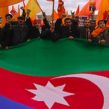
The Civil Society Factor Becoming Important in Azerbaijan’s Upcoming Elections
Publication: Eurasia Daily Monitor Volume: 7 Issue: 197
By:

Azerbaijan’s perceived willingness to hold the next parliamentary elections in an open, transparent and democratic atmosphere has attracted an unprecedented level of international attention for this rapidly evolving, young democracy with one of the fastest growing economies in the world.
Paradoxically, more than 25,000 observers are expected to attend the upcoming parliamentary elections and over 600 foreign representatives will be involved in monitoring of the election process. While the ruling party YAP and opposition groups urge the voters to be active in elections and vote for the most worthy candidates, independent experts stress the serious activeness in anticipation of parliamentary elections (www.news.az, October 27; Trend News Agency, September 22).
Meanwhile, international organizations like the Council of Europe (CoE) and the Organization for Security and Cooperation in Europe (OSCE) are closely watching the establishment and development of civil society in Azerbaijan. The upcoming elections will make it clear what is being done for the development of civil society in the evolution of this young aspiring democracy.
Quite obviously, renewed interest in the pre-election environment is directly connected with the public statements of the government on the democratic, transparent and fair elections in the country. So far the government, except the statements about the guarantees on conducting the transparent elections, has not allowed any activity that could affect a fair and democratic election process. The Baku-based OSCE office in cooperation with the Presidential Administration of Azerbaijan and the Central Election Commission (CEC) has held a series of roundtable discussions covering the role of civil society in the run-up to the forthcoming parliamentary elections on November 7. The discussion sessions actually aim to help ensure that overall coverage of the election is transparent, inclusive, accurate and impartial. Senior representatives from the presidential administration, CEC, National TV, political parties, media outlets, civil society, including the press council and independent experts took part in OSCE-organized discussion meetings on election matters (www.today.az, August 25; www.azernews.az, August 25).
Without doubt civil society in Azerbaijan is playing an important role during the upcoming elections. According to the CEC reports, during the 2008 presidential elections more than 40,000 registered local observers participated in the election process. Today in Azerbaijan the number NGO’s is more than 3,000 and each of them can participate in the election process as an observer. Those who previously served as local independent experts in the election process emphasize that unlike in the 2003 presidential elections, civil society today in Azerbaijan is third (behind Russia and Kazakhstan in the post-Soviet countries) as defined by the number of NGO’s (Media Forum Agency, October 19).
However, there are some problems in civil society, such as the lack of professional and technical abilities. While the significance of education and monitoring are being emphasized and carried out, other important developments like social advocacy remain quite weak (Media Forum Agency, October 19). Seven blocs, created by civil society organizations during the 2005 parliamentary election are still remembered for their activity, intensity and numbers. Among them are “Independent Media 2005,” “Female Election Bloc,” “Young Azerbaijan-New Names,” and others. Unfortunately, one can see that such activity by the civil society will not be present in the forthcoming elections.
Yet independent candidates, formerly associated with civil society organizations, have also become interested in participating in the election. A majority election system is in effect in Azerbaijan, and this system promotes representation by different levels of society, especially the middle class, since this system increases the possibility for someone to run as an independent candidate. From this standpoint, it is not surprising that representatives of the middle class will run for the parliament from districts where they are known and familiar.
Nevertheless, Azerbaijani civil society is trying to eliminate the election-related problems. Several seminars and workshops were hosted by various civil society groups which seek to find the ways of how to resolve problematic issues. As noted by local NGO leader Eldar Ismayilov, “The laws in Azerbaijan are up to date and there is the possibility of holding free and transparent elections and the crucial role of NGO’s in this process is undisputable” (APA News Agency, September 3).
Recently, ten heads of NGO’s declared their plans to run in the current parliamentary race. Furthermore, the “Parliament–2010” election monitoring coalition aims to observe seventy-five election districts. Another local NGO “Human Rights Lawyers Committee” will prepare information regarding election laws and rights and will monitor election-related court procedures. According to the report prepared by the Center for Election Monitoring and Education of the Democracy, free and fair elections will help to promote democratic traditions and human rights and will guarantee further prosperity to the citizens. With this in mind, this NGO will monitor the progress of the election process, as well as observe political activity among the constituencies and collect data on how well the voters are informed. All these trends seem to testify to the fact that the civil society factor in Azerbaijan is becoming important in the November elections (www.elpress.az, Trend News Agency, October 12).




